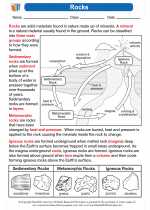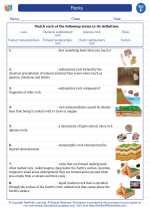What is the Water Cycle?
The water cycle, also known as the hydrologic cycle, is the continuous movement of water on, above, and below the surface of the Earth. It involves the processes of evaporation, condensation, precipitation, and runoff, and is vital for the distribution of water across the planet.
Key Processes in the Water Cycle
- Evaporation: This is the process by which water from the Earth's surface, such as oceans, lakes, and rivers, is heated by the sun and changes into water vapor, rising into the atmosphere.
- Condensation: As the water vapor rises, it cools and condenses to form clouds. This is the process where the water vapor turns back into liquid water.
- Precipitation: When the condensed water droplets in clouds become heavy enough, they fall to the Earth's surface as rain, snow, sleet, or hail.
- Runoff: This is the movement of water from land surfaces into streams and rivers, eventually flowing back into the oceans, starting the cycle again.
Importance of the Water Cycle
The water cycle is crucial for maintaining the Earth's ecosystems and supporting life. It helps regulate the Earth's temperature, provides fresh water for plants and animals, and replenishes water sources such as rivers, lakes, and groundwater.
Study Guide for the Water Cycle
To understand the water cycle, it's important to remember the key processes and their significance. Here are some study questions to help you grasp the concept:
- What are the key processes involved in the water cycle?
- How does evaporation occur, and where does it take place?
- Explain the role of condensation in the water cycle.
- What are the different forms of precipitation, and how do they contribute to the water cycle?
- Describe the significance of the water cycle for the environment and living organisms.
Understanding the water cycle is essential for comprehending the Earth's water distribution and the impact of human activities on this vital process.
.◂Science Worksheets and Study Guides Sixth Grade. Rocks

 Activity Lesson
Activity Lesson
 Worksheet/Answer key
Worksheet/Answer key
 Worksheet/Answer key
Worksheet/Answer key
 Worksheet/Answer key
Worksheet/Answer key
 Worksheet/Answer key
Worksheet/Answer key
 Vocabulary/Answer key
Vocabulary/Answer key
 Vocabulary/Answer key
Vocabulary/Answer key
 Vocabulary/Answer key
Vocabulary/Answer key
